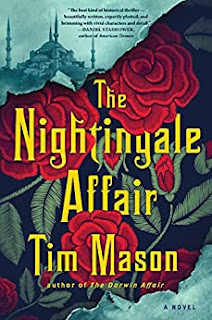Tim Mason is the author of the new historical novel The Nightingale Affair. His other books include The Darwin Affair, and he is also a playwright.
Q: Did you know when you began your previous novel featuring your character Inspector Field, The Darwin Affair, that you'd be writing another?
A: When I began The Darwin Affair I had no notion of a second Inspector Field novel. At that point, I didn't know Inspector Field! I think one falls in love with characters gradually - at least, I do. The more acquainted I became with Charles Field, the more I liked him.
Similarly, I didn't know his wife Jane at the outset, and certainly didn't know the two children Field rescued from the psychotic killer. But by the time he and Jane took the children into their household I was in love with the whole lot of them, and couldn't bear to let them go. Hence, the second novel.
Q: Why did you decide to include Florence Nightingale in this novel?
A: I discovered Miss Nightingale as I researched historical figures of the Victorian Era for Darwin. One of my sources was Lytton Strachey's Eminent Victorians, which includes a biographical essay about Florence. It was eye-opening.
I'd known Nightingale - vaguely - as the gentle "lady with the lamp." I had no idea of the fierce struggles she'd fought to bring her nursing skills to the British soldier during the Crimean War, nor did I know anything about her own quietly ferocious persona.
I was hooked. I tried to find a way to work her into The Darwin Affair but she was too big - she wouldn't fit. She demanded a novel of her own.
Q: How did you research the novel, and what did you learn that especially surprised you?
A: In addition to Google searches, I read lots and lots of books: biographies of Nightingale, of course, but others as well, including a fascinating bio of the remarkable Benjamin Disraeli, and another of Wilkie Collins, even though they ended up making only cameo appearances in my novel. I didn't make it through the entire history of the Crimean War that I bought, but took what I needed from it.
Most surprising to me was the intensity of the hatred that met Nightingale and her nurses in the British hospital at Scutari, Turkey. They were seen as violating the exclusively male worlds of medicine and the military.
Q: As a novelist and playwright, do you have similar writing routines for each craft, or is the process quite different?
A: Writing a novel is very different to writing a play. It take much longer, for one thing!
Writing for the theater is all about contraction, condensation, economy; the story needs to unroll in dialogue lasting between 90 and 120 minutes or so.
The novel allows the writer to expand, to fill in gaps with description and detail and conjecture, and to go beyond the limitations of a physical stage and an audience's attention span. You can pick a novel up and put it down again for a meal or a night's sleep, for instance. There's no pausing the locomotive of a play.
Q: What are you working on now?
A: Speaking of locomotives: On a hot June day in 1865, the foreman of a railroad work detail misread his timetable, and ordered his men to remove the rails of a bridge above a riverbed for repairs. And so the train carrying cross-channel passengers from Boulogne to London, including Charles Dickens, his young mistress, and her mother, hurtled into mid-air.
Their carriage landed precariously on the opposite side of the gulf; the rest of the cars plummeted into the gorge. Dickens courageously descended to care for the wounded and dying passengers, but not before he'd quietly got the two women he'd been traveling with out and onto conveyances bound for London. It was vital to him, and his career, that his illicit love affair be kept secret.
This much is historically accurate. But what if someone saw him and the young woman, someone who had reason to hate Dickens and his detective friend, Inspector Field? I don't yet know if I'll write The Dickens Affair but this is what I'm currently thinking about.
--Interview with Deborah Kalb. Here's a previous Q&A with Tim Mason.


No comments:
Post a Comment